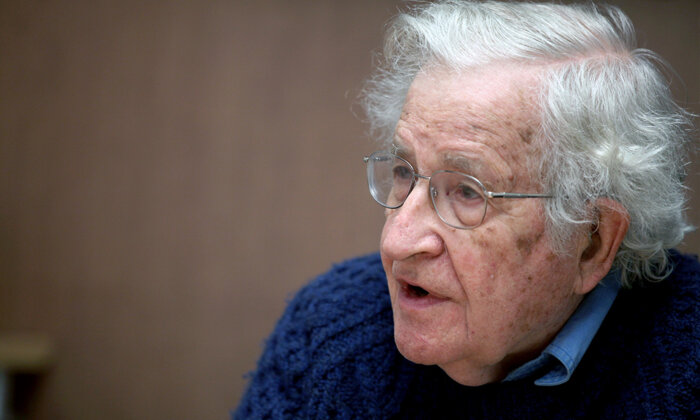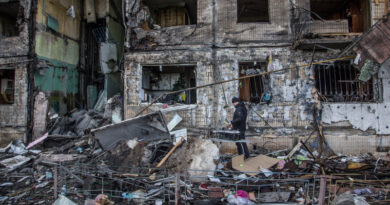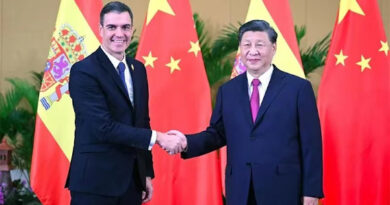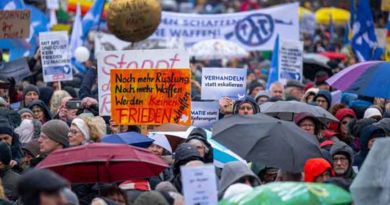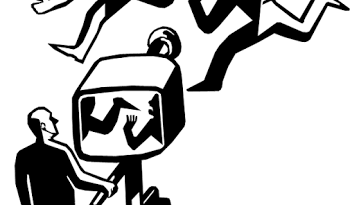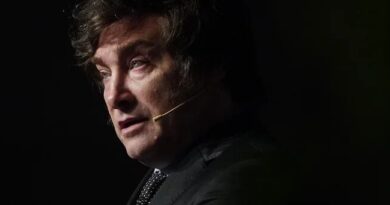Chomsky: a stronger NATO is the last thing we need
CJ POLYCHRONIOU
Noam Chomsky, one of the most cited academics in the world and considered by millions of people as an international intellectual treasure, maintains a prodigious lucidity at the age of 95. In this interview -published in collaboration with truthout– the eminent professor flatly rejects the idea that a stronger NATO is needed instead of a negotiated solution to the Ukraine conflict and warns of the current strategy of “much worse” and the increasing risk of escalation towards nuclear war .
CJ Polychroniou: The war in Ukraine is celebrating its first anniversary and not only is the end of the fighting not in sight, but the flow of weapons from the US and Germany to Ukraine is increasing. What's next on the NATO/US agenda? one wonders. Urge the Ukrainian army to retaliate by attacking Moscow and other Russian cities? So what is your assessment, Noam, of the latest developments in the Russia-Ukraine conflict?
Noam Chomsky : It is useful to start by asking what not on the NATO/US agenda. The answer to that is easy: efforts to end the horrors before they get worse. The “much worse” begins with the increasing devastation of the Ukraine, terrible enough, though nowhere near the scale of the US/UK invasion of Iraq or, of course, what the US/UK destruction of Indochina was. part of USA. That doesn't come close to exhausting the highly relevant list. To take a few minor examples, as of February 2023, the UN estimates civilian deaths in Ukraine at around 7.000. That is certainly a big understatement. If we triple that, we arrive at the likely death toll of the US-backed Israeli invasion of Lebanon in 1982. Washington. And so it goes on.
But this is an exercise in futility, indeed contemptible in Western doctrine. How dare one bring up Western crimes when the official task is to denounce Russia as uniquely hideous! Furthermore, for each of our crimes, elaborate apologies are readily available. They quickly collapse into the investigation, as has been shown in painstaking detail.
All of that is irrelevant within a well-functioning doctrinal system, in which "unpopular ideas can be silenced and inconvenient facts kept hidden, without the need for an official ban," to borrow George Orwell's description of free England in his introduction (unpublished) to Rebelion on the farm.
THE “”MUCH WORSE” GOES MUCH BEYOND THE Gloomy BALANCE OF THE UKRAINE
But the “much worse” goes well beyond Ukraine's gloomy balance sheet. It includes those facing famine from reduced grain and fertilizer from the rich Black Sea region; the growing threat of moving up the ladder of nuclear war (which means terminal war); and possibly worst of all, the sharp reversal of limited efforts to avert the impending catastrophe of global warming, which should not need to be reviewed. Unfortunately, there is a need.
We cannot ignore the euphoria of the fossil fuel industry over skyrocketing profits and the tantalizing prospects of decades more destruction of human life on Earth, while abandoning their marginal commitment to sustainable energy as it soars. the profitability of fossil fuels. And we cannot ignore the success of the propaganda system in diverting these concerns from the minds of the victims, the general population.
The latest Pew survey of popular attitudes on pressing issues didn't even ask about nuclear war. Climate change was last on the list; among Republicans, 13%. It is, after all, just the biggest issue to come up in human history, yet another unpopular idea that has been effectively suppressed. The poll coincided with the last setting of the Doomsday Clock, moved forward to 90 seconds to midnight, another record, driven by the usual worries: nuclear war and environmental destruction. We can add a third concern: the silencing of the awareness that our institutions are leading us to catastrophe.
Let's return to the current issue: how politics is being designed to cause “something much worse” by escalating the conflict. The official reason remains the same as before: to severely weaken Russia. Liberal commentators, however, offer more humane reasons: we must ensure that Ukraine is in a stronger position for eventual negotiations. Or in a weaker position, an alternative that is not considered, although it is still quite realistic.
In the face of arguments as powerful as these, we must focus on sending American and German tanks, probably jet planes soon, and more direct US and NATO involvement in the war. What is likely to come next is not hidden. The press has just reported that the Pentagon is calling for a top-secret program to insert "monitoring equipment" into Ukraine to monitor troop movements. It has also revealed that the United States has been providing targeting information for all advanced weapons strikes, “a previously undisclosed practice that reveals a deeper and more operationally active role for the Pentagon in the war.”
At some point there could be Russian retaliation, another rung on the escalation ladder. Continuing on its current course, the war will come to vindicate the view in much of the world outside the West that it is a Russo-American war with Ukrainian corpses, more and more corpses. The view, to quote Ambassador Chas Freeman, that the United States appears to be fighting Russia to the last Ukrainian, reiterating the conclusion of Diego Cordovez and Selig Harrison that in the XNUMXs the United States was fighting Russia to the last Afghan.
THE WAR IS A BONANCE FOR THE MAIN SECTORS OF THE US ECONOMY
The official policy of severely weakening Russia has been truly successful. As many commentators have commented, for a fraction of its colossal military budget, the United States, through Ukraine, is significantly degrading the military capability of its only adversary in this arena, no mean feat. It's a boon for major sectors of the US economy, including the fossil fuel and military industries. In the geopolitical realm, it resolves - at least temporarily - what has been a major concern throughout the post-World War II era: ensuring that Europe remains under US control within the NATO system rather than heading off on an independent and integrate more closely with its resource-rich trading partner to the East.
Temporarily. It is not clear how long the complex German-based European industrial system will be willing to face decline, even some de-industrialization, subservient to the US and its British lackey. Is there any hope that diplomatic efforts will escape the steady drift toward disaster for Ukraine and beyond? Given the lack of interest from Washington, there is little research in the media, but enough has leaked from Ukrainian, American and other sources to make it reasonably clear that there have been possibilities, even as recently as last month. of March. We have already discussed them in the past and evidence of varying quality continues to appear.
Are there still opportunities for diplomacy? As the fighting continues, it is foreseeable that the positions will harden. Right now, the Ukrainian and Russian positions seem irreconcilable. It is not a new situation in world affairs. It has often turned out that “peace talks are possible if there is the political will to start them”, a situation that two Finnish analysts are now suggesting. They then outline steps that can be taken to ease the path to further accommodation. They point out, rightly, that the political will exists in some circles: including the head of the Joint Chiefs of Staff and senior members of the Council on Foreign Relations.
So far, however, vilification and demonization are the preferred method for this deviation from commitment to “much worse”, often accompanied by lofty rhetoric about the cosmic struggle between the forces of light and dark. This rhetoric is all too familiar to those who have paid any attention to America's exploits around the world. We might, for example, recall Richard Nixon's appeal to the American people to join him in pulverizing Cambodia: "If, when push comes to shove, the most powerful nation in the world, the United States of America, acts Like a pitiful and helpless giant, the forces of totalitarianism and lawlessness will threaten free nations and free institutions throughout the world.” A constant chorus.
Putin's invasion of Ukraine has clearly hit the ceiling, but as in any war, there is dishonesty, propaganda and lies flying left and right from all sides involved. On some occasions, there is also utter madness in the thinking of some commentators which, unfortunately, masquerades as analytical discourse worthy of publication on the world's leading so-called opinion pages. "Russia must lose this war and demilitarize," argued the authors of a recent article in Project Syndicate. Furthermore, they claim that the West does not want to see Russia defeated. And they cite you as one of those who is somehow naive enough to believe the idea that the West is responsible for creating the conditions that led to Russia's attack on Ukraine. What do you think and how do you react to this “analysis” of the current war in Ukraine, which I suppose is shared not only by Ukrainians, but also by many other citizens of Eastern Europe and the Baltics, not to mention the United States?
There is little point in wasting time with “absolute madness” which, in this case, also calls for the devastation of the Ukraine and extensive damage far beyond. But it's not totally crazy. They are right about me, although they might add that I share the company of almost all historians and a wide range of leading political intellectuals since the 90s, including prominent hawks, as well as the highest echelon of the diplomatic corps who knows something about Russia, from George Kennan and Reagan's ambassador to Russia Jack Matlock, to Bush II's defense secretary Robert Gates, to the current head of the CIA, and an impressive list of others. In fact, the list includes any literate person capable of reviewing the very clear historical and diplomatic records with an open mind. It is certainly worth reflecting seriously on the history of the last 30 years, since Bill Clinton launched a new Cold War by violating the United States' firm and unequivocal promise to Mikhail Gorbachev that "we understand the need to give guarantees to the eastern countries. If we maintain a presence in a Germany that is part of NATO, it would not extend the jurisdiction of NATO forces one inch to the east." Those who want to ignore history are free to do so, at the cost of not understanding what is happening now, and what are the prospects of avoiding "something far worse."
Another unfortunate strand in the human mindset in relation to the Russo-Ukrainian conflict is the degree of racism manifested by many commentators and policy makers in the Western world. Yes, fortunately, Ukrainians fleeing their country have been welcomed with open arms by European countries, which of course is not the treatment accorded to those fleeing parts of Africa and Asia (or Central America in the case of the United States) because of persecution, political instability and conflict, and the desire to escape poverty. In fact, it is hard to miss the racism hidden behind the thinking of many who say that the US invasion of Iraq should not be compared to the Russian invasion of Ukraine because the two events are on a different level. . This is, for example, the position adopted by the Polish neoliberal intellectual Adam Michnik, who, by the way, also cites you as one of those who commits the cardinal sin of not drawing distinctions between the two invasions! Your reaction to this kind of "intellectual analysis"?
Outside the self-protective Western bubble, racism is perceived in even starker terms, for example by the distinguished Indian writer and political activist/essayist Arundhati Roy: “Ukraine is not seen here, of course, as something with a clear moral that count. When brown or black people are bombed or shocked, it doesn't matter, but with white people it's supposed to be different." I will return directly to the "cardinal sin", a very revealing aspect of contemporary high culture in the West, imitated by loyalists elsewhere. However, we must recognize that Eastern Europe is a bit of a special case. For obvious and familiar reasons, Eastern European elites tend to be more susceptible to American propaganda than the norm. That is the basis of Donald Rumsfeld's distinction between Old and New Europe. Old Europe is the bad guys, the ones who refused to join the US invasion of Iraq, weighed down by outdated ideas about international law and elementary morality. The New Europe, mainly the old Russian satellites, are the good guys, free of that ballast.
Finally, there are even some “left” intellectuals who have taken the position that the world now needs, in light of the Russian invasion of Ukraine, a stronger NATO and that there should be no negotiated solution to the conflict. I find it hard to stomach the idea that someone who claims to be part of the radical leftist tradition advocates NATO expansion and is in favor of continuing the war, so what is your take on this particularly "leftist" position? strange?
Somehow I missed the calls on the left for a revival of the Warsaw Pact when the US invaded Iraq and Afghanistan while also attacking Serbia and Libya, always under pretexts, by the way.
Those calling for a stronger NATO should think about what NATO is doing right now, and also how it presents itself. The last NATO summit extended the North Atlantic to the Indo-Pacific, that is, the whole world. NATO's role is to participate in the US project of planning a war with China, which is already an economic war, since the United States is dedicated (and by obligation, its allies) to impeding Chinese economic development, with steps towards a possible military confrontation looming not far in the distance. Again, terminal war.
We've talked about all this before. There are new developments as Europe, South Korea and Japan ponder how to avoid a serious economic decline by following orders from Washington to withhold technology from China, their main market.
THE SELF-IMAGE THAT NATO IS PROUDLY BUILDING
It is also interesting to see the self-image that NATO is proudly building. An instructive example is the US Navy's latest acquisition, the amphibious assault ship USS Fallujah, named to commemorate the two Marine attacks on Fallujah in 2004, among the most heinous crimes of the US invasion of Iraq.
It is normal for imperial states to ignore or try to explain away their crimes. It's a bit more unusual to see them celebrated. Outsiders are not always amused, including Iraqis. Reflecting on the commissioning of the USS Fallujah, Iraqi journalist Nabil Salih describes a soccer field “known as the Martyrs' Cemetery. It is where residents of the once-besieged city [of Fallujah] buried the women and children massacred in repeated US assaults to suppress a furious rebellion in the early years of the occupation. In Iraq, even playgrounds are now places of mourning. The war meant bathing Fallujah in depleted uranium and white phosphorus."
“But American savagery did not end there,” Salih continues: “Twenty years and untold birth defects later, the US Navy christens one of its warships the USS Fallujah…. This is how the American empire continues its war against the Iraqis. The name of Fallujah, bleached in white phosphorus implanted in the wombs of mothers for generations, is also the spoils of war. In a statement from the US empire explaining the decision to name a warship Fallujah, it is said that 'the Marines prevailed over a determined enemy who enjoyed all the advantages of defending himself in an urban area' … What remains is the haunting absence of family members, homes bombed to non-existence, and photographs burned along with smiling faces. In their place, the unpunished war criminals of Downing Street and the Beltway bequeathed to us a lethally corrupt system of inter-sectarian camaraderie.
Salih quotes Walter Benjamin in his Theses on the Philosophy of History: "Whoever has emerged victorious participates to this day in the triumphal procession in which the current rulers pass over those who lie prostrate." “Through this historical revisionism,” Salih concludes, “the United States has launched another attack on our dead. Benjamin had warned us: 'Even the dead will not be safe from the enemy if he wins.' The enemy has won."
THE TRUE IMAGE OF NATO
That is the true picture of NATO, as many victims can attest. But what do the Iraqis, or other browns and blacks like them, know? For “The Truth” one can turn to a Polish writer dutifully parroting the most vulgar American propaganda, echoing many of his counterparts among his country's commissars. However, let's be fair. At the time of the massacre, the US media did report what was happening. I can do no better than to quote at length from the tremendous compilation of much of that information that the Australian journalist John Menadue published in 2018.
That is NATO, for those willing to learn about the world. But enough of this deplorable whataboutism. The orders from above are that it is outrageous to compare the new Hitler's assault on Ukraine to the misguided but benign US-UK mission of mercy to help Iraqis by overthrowing an evil dictator, whom the US enthusiastically supported until on their worst crimes, but that's hardly a fare fit for the intellectual class.
Again, however, we must be fair. Not everyone agrees that it is improper to raise questions about the US mission in Iraq. Recently, there was much uproar over Harvard's rejection of Human Rights Watch director Kenneth Roth for a position at the Kennedy School, quickly rescinded under protest. Roth's credentials were lauded. He even took the negative stance in a debate, moderated by well-known human rights advocate Samantha Power, about whether the invasion of Iraq qualifies as a humanitarian intervention (Michael Ignatieff, director of the Carr Center for Human Rights, argued that it did meet the criteria). requirements).
How lucky we are that, at the top of the intellectual world, our culture is so free and open that we can even hold a debate about whether the company was an exercise in humanitarianism. The undisciplined might wonder how we would react to a similar event at Moscow University.

